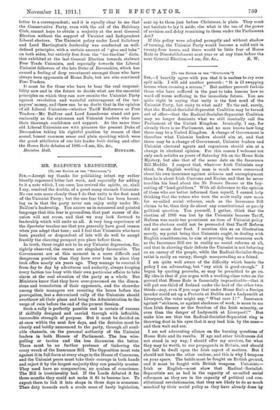MR. BALFOUR'S LEADERSHIP.
[70 THE EDITOR Ol THE "SPECTATOR."] Sin,—Accept my thanks for publishing intact my rather bluntly expressed letter last week, and especially for adding to it a note which, I am sure, has revived the spirits, or, shall I say, resolved the doubts, of a great many staunch Unionists. No one sees more clearly than I do that unity is the first need of the Unionist Party ; but the one fear that has been haunt- ing us is that the party never can enjoy unity under Mr. Baifour's leadership. You assure us in measured and pointed language that this fear is groundless, that past causes of dis- union will not recur, and that we may look forward to leadership which will unite us all. A very long experience of the Spectator teaches me that you generally have good reason when you adopt that tone ; and I feel that Unionists who have been puzzled or despondent of late will do well to accept frankly the cheering prospect you place before them.
In truth, there ought not to be any Unionist depression, for, rightly observed, the omens are singularly favourable. The Government are at this moment in a more difficult and dangerous position than they have ever been in since they took office nearly six years ago. They manage to conceal it from day to day by adroitness and audacity, always keeping every faction too busy with their own particular affairs to take alarm at the real situation of the party as a whole. But Ministers know that they have over-presumed on the dissen- sions and irresolution of their opponents, and the shrewder among their managers are counting the hours before the prorogation, lest a determined rally of the Unionists should overthrow all their plans and bring the Administration to the verge of ruin before the end of the present Session.
Such a rally is perfectly possible and is certain of success if skilfully designed and carried through with inflexible, inexorable strength of purpose. But it must be decided on at once within the next few days, and the decision must be clearly and boldly announced to the party, through all avail- able channels, on the personal authority of the Unionist leaders in both Houses of Parliament. The less wire- pulling or tactics and the less discussion the better. There must be no further pretence of tinkering the crazy wreck of the Insurance Bill. The Opposition must vote against it in full force at every stage in the House of Commons, and the Unionist peers must take their courage in both bands and reject it by the largest majority they can possibly muster. They need have no compunction,' no qualms of conscience. The Bill is irretrievably bad. If the Lords debated it for three months they could not make it fit to become law. To expect them to lick it into shape in three days is nonsense. Their duty towards such a crude mass of hasty legislation,
sent up to them just before Christmas, is plain. They must not hesitate to lay it aside, else what is the use of the power of revision and delay remaining to them under the Parliament Act?
If this policy were adopted promptly and without shadow of turning, the Unionist Party would become a solid unit in twenty-four hours, and there would be little fear of Home Rule or Disestablishment next year or at any time before the
next General Election.—I am, Sir, &c., B. W.


















































 Previous page
Previous page